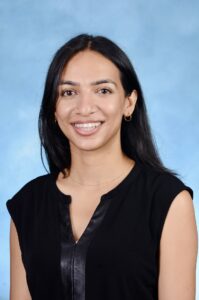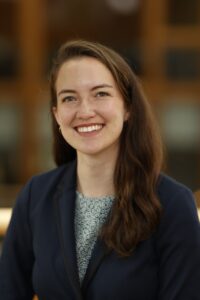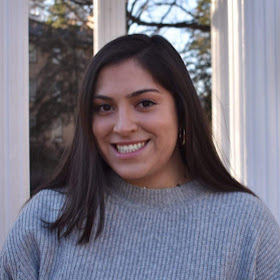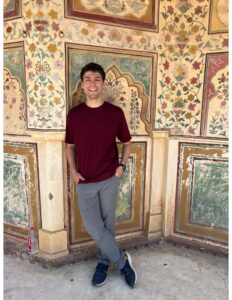Cohort 5 (2023) of our Global Health Scholarly Concentration
Srijana Bhattarai Chhetri
Class of 2026

As she got higher education, she understood how this is affected by socioeconomic, demographics, and geographical factors leading to a cycle of poverty among the most vulnerable populations in low/middle- income countries. The risk of getting these diseases is already high, and once infected, the increased morbidity and mortality rates causes loss of productivity, thus perpetuating the poverty cycle.
With this interest, she joined an ID lab at UNC in undergraduate and worked on malaria and SaRS-CoV2 molecular studies and spent some time in Tanzania during her gap year. In medical school through the help of office of OGHE, she went to Cameroon to study the prevalence of arboviruses.
Sujata Bhattarai Chhetri
Class of 2026

“Health is wealth” is a phrase Sujata frequently heard from her father growing up. Her experience living in both Nepal and the United States allowed her to see first-hand that although health is wealth, in a world where millions of people do not have access to basic healthcare, not everyone has the same opportunities to attain their full health potential. Having lived in a resource poor setting as well as realizing the abundance of opportunities and privileges she has in the US truly motivates her to work globally and give back where she can.
Sujata began exploring her interest in global health during her undergraduate years at UNC by taking classes related to global studies and medical anthropology. Studying abroad in Ireland after her freshmen year of college was another experience that opened her eyes to how different health systems are in different countries. During her sophomore year in college, she was a finalist for the Vimy Global Team Award for a research project focused on comparing the effect of menstruation taboos in adolescent girls in rural versus urban Nepal. Along with these experiences, reading books such as A Heart for the Work by Claire Wendland really inspired her and taught her how differently the world operates in high versus low-income countries and how our contrasting ways of life influence disease. Following her passions, she spent the summer after the first year of medical school in Uganda studying the epidemiology of pediatric severe malaria.
In medical school, Sujata is involved in Physicians for Human Rights through which she directly works with and advocates for the local refugee population. She also helps out at the student led free health clinic in UNC for the uninsured and underinsured population. Moreover, she aims to make an impact locally by holding leadership position roles in the Student National Medical Association and Student Government Association at UNC.
Sujata is excited to continue learning about the intricacies of global health and to be trained as a global minded physician. With the increase in globalization and industrialization we are all more interconnected than we think (e.g., COVID-19) and she believes it is important to be able to take topics in medicine and think about them in a global perspective. She is looking forward to continuing global work and serving the vulnerable populations both at home and abroad.
Anna Ilyasova
Class of 2026

Anna sees global health as an important tool for improving human rights and is excited to continue learning about this during medical school. Anna was born in Moscow to two Ukrainian parents who moved to Russia for educational opportunities during the time of the USSR. After moving to the US at a young age, she noticed the growing disparities between her family’s healthcare access in the US and that of her relatives in Eastern Europe. This was her first impression on the importance of global public health work. She has followed this interest by pursing a BSPH in Health Policy and Management at Gillings, working at the UN Refugee Agency in Geneva, and working as a vaccine equity consultant for UNICEF’s Regional Office for Europe and Central Asia. During an internship at the NIH, she researched the importance of sickle cell disease support for refugees’ healthcare access in the US. Following her first year of medical school, she joined a research project to study barriers to methadone access among people who inject drugs in Kyrgyzstan.
During medical school, Anna is excited to support advocacy for refugees by being a co-president of Physicians for Human Rights. She would like to continue being involved in local and global public health opportunities after medical school, but in the meantime, is thrilled to be part of the global health scholarly concentration cohort to learn from UNC SOM faculty who do great things for underserved communities near and far.
Sydney Puerto-Meredith
Class of 2026

Growing up in a multicultural household, and having the opportunity to live in Peru as a teenager ignited Sydney’s lifelong pursuit of experiencing and understanding the diversity of humans across the globe. Coupled with an interest in infectious disease, she was excited to conduct malaria research in Malawi with the Infectious Disease Epidemiology and Ecology Lab (IDEEL) during her undergraduate degree in Biology and Global Studies. After university, she followed her research to Lilongwe, Malawi, where she lived for 1.5 years investigating transfusion transmissible infections in the blood supply and acute HIV infection detection studies across the country. In medical school, she spent the summer after her first year in Bolivia for 7 weeks investigating congenital Chagas. These experiences, along with her own family’s experience immigrating from Nicaragua, allowed Sydney to realize her passion and dedication to global health. She aspires to be a leader in medicine to help alleviate health disparities among vulnerable populations through research and clinical care. She has specific interests in immigrant and refugee health, disease outbreaks and health inequity. She hopes to pursue a career in global health living abroad long-term.
Zachiariah Stern
Class of 2026

How can we empower someone who isn’t familiar with a healthcare system to get the best possible care? How can we learn from the ways other societies practice healthcare to reflect the unique cultural needs of different communities? Seeking answers to these questions is what sparks Zack’s passion for global health. He wants to pursue a medical career in which he can continue to explore and create sustainable global connections that span cultural, medical, and scientific practices.
After studying biology at Amherst College, Zack moved to Cyprus where he taught English and Science in a public primary school with the Fulbright Program. Outside of the classroom, he also taught English to asylum seekers and worked in a molecular virology lab at the University of Cyprus. Returning home, he was inspired by his international work to volunteer with a free health clinic that provided vaccinations and access to primary care to immigrant populations in Nashville, TN. To better understand how to support the health well-being of diverse communities, Zack then completed a Master of Public Health at the University of Minnesota, where he took his first formal classes in Global Health. Additionally, he volunteered with multiple organizations (CUHCC, E.Y.E. Program) providing preventive healthcare across global communities in the Twin Cities. He is honored to have had many inspirational mentors and is excited to continue learning with the goal of developing programs and systems that provide the best, most appropriate care for global populations.